

Undergraduate Research Opportunities
Home » Research » Undergraduate Research Opportunities
The USC Leonard Davis School offers numerous opportunities for undergraduates to participate in research.
Conducting research at USC Leonard Davis is a great way to get to know faculty, graduate students, and other undergraduates who share similar academic and career interests. Students participating in research at our school have published papers, presented at conferences and won numerous awards.
Explore this section to learn more about opportunities to contribute to the exciting research taking place at the USC Leonard Davis School. Some positions may include funding from our school, university or outside sources and be open to applicants from across USC and/or from outside institutions.
USC Leonard Davis School Laboratories and Research Groups
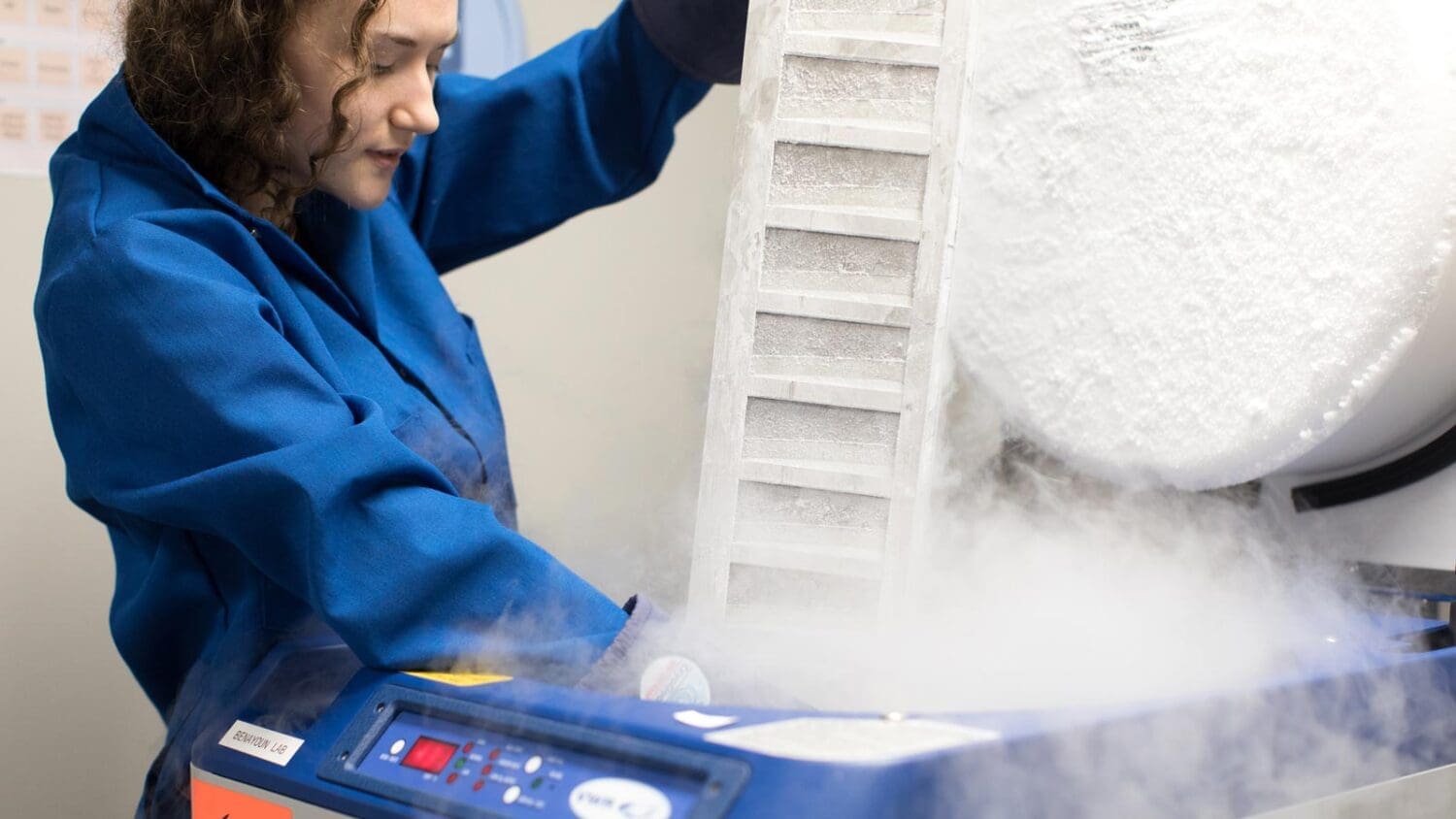
Below is a list of laboratories and research groups that are currently accepting applications for undergraduate research:
USC GEMSTEM
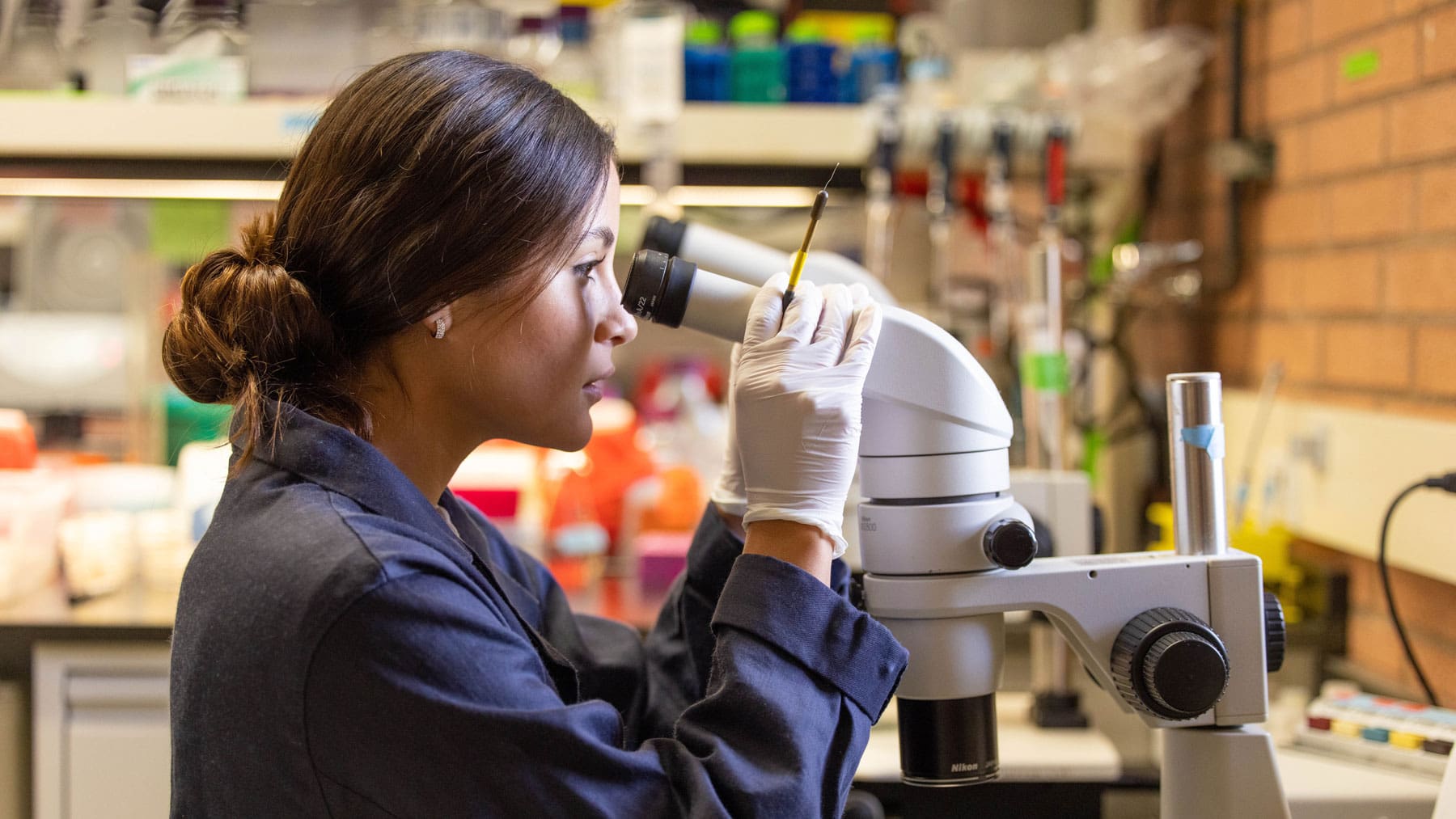
The Gerontology Enriching Medicine, Science, Technology, Engineering and Mathematics (GEMSTEM) to Enhance Diversity in Aging program integrates research, education, and professionalization for aging curious undergraduate scholars at the University of Southern California from underrepresented minority backgrounds.
USC Discovery Scholars
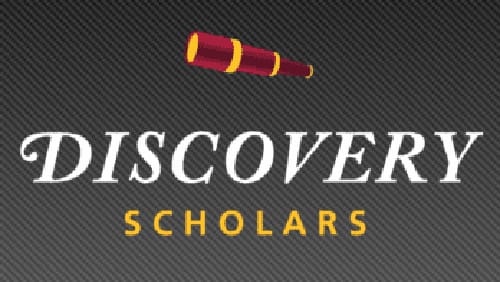
The USC Leonard Davis School offers gerontology research opportunities through USC’s signature program that honors students who engage in undergraduate research or artistic endeavor with faculty guidance.
USC Student Programs
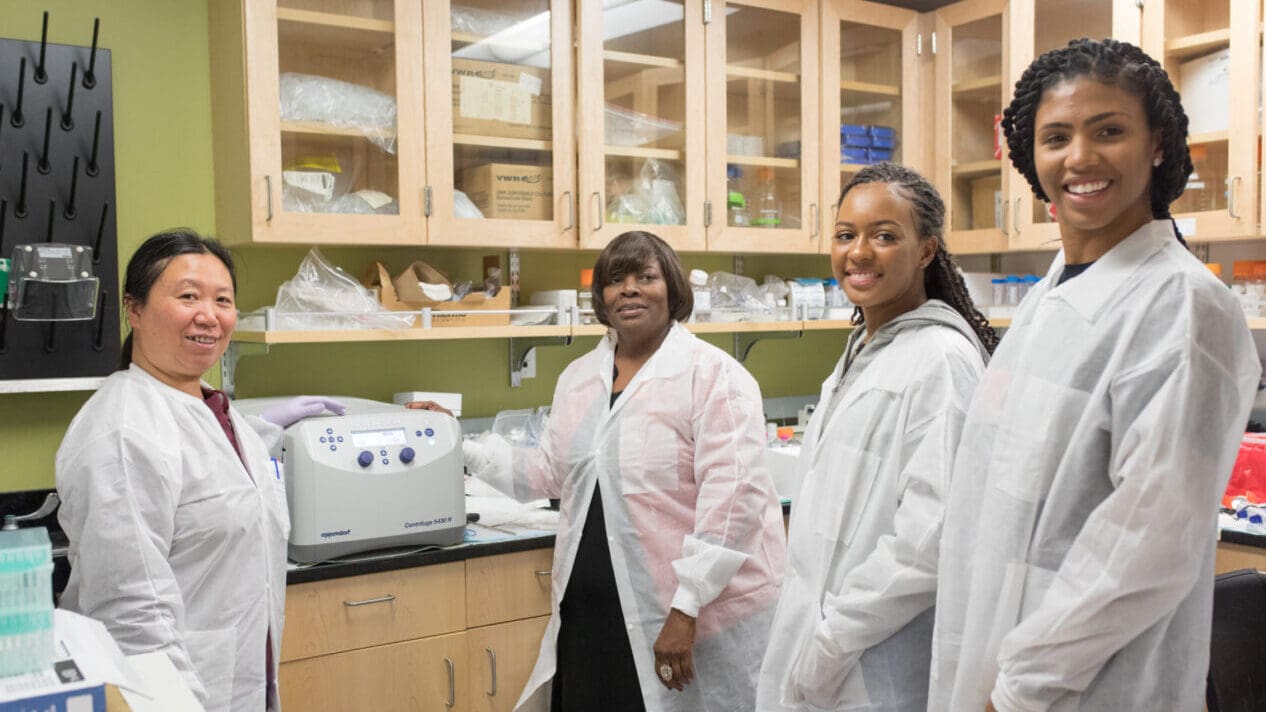
Diversity in Research
USC offers programs for students and postdocs at USC that support diversity and scholarship in research, as a foundation toward future efforts.
National Institute on Aging’s Advancing Diversity in Aging Research (ADAR) Initiative
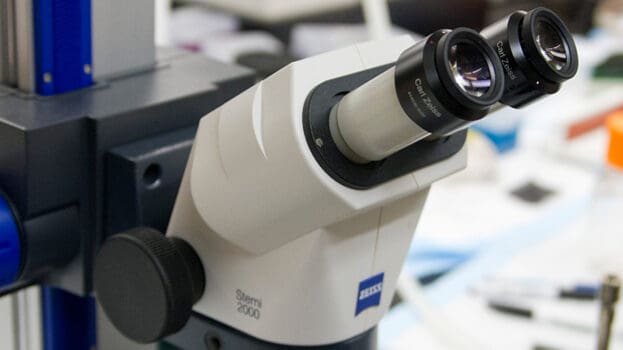
Information about the USC Leonard Davis School’s commitment to the ADAR Initiative will be shared soon.
Cancer Research Education and Engagement (CaRE 2 ) program
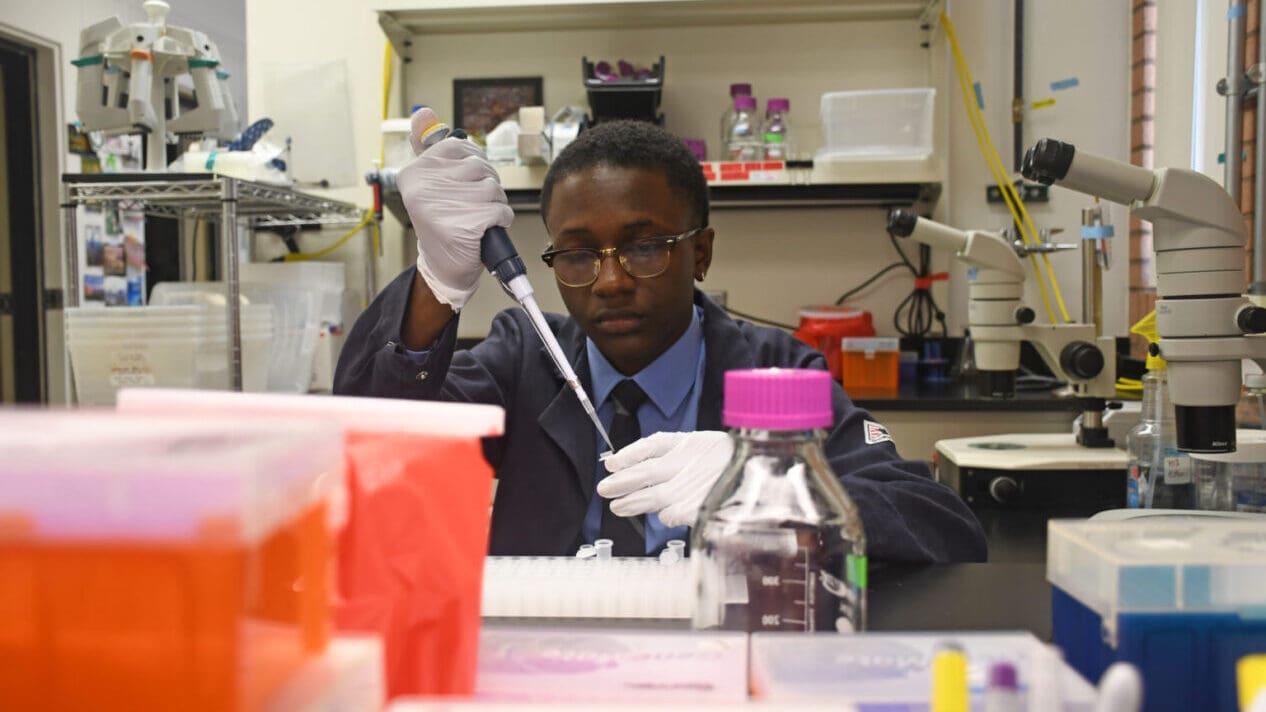
CaRE² funds training opportunities for Black and Latino investigators, from students to early-career scientists, in order to increase the workforce focused on translational cancer and enhancing our scientific community.

Some approved work-study lab research positions may be available to students who are eligible to receive work-study funds. Visit the USC Career Center webpage for information about the Work-Study Job Fair and for all student job openings. For more information about federal work-study, refer to USC’s webpage.
If you are interested in an undergraduate research position in one of our labs, please reach out to Sara Robinson: [email protected]
Visit the USC Office of Undergraduate Education to learn more about undergraduate research opportunities at USC.
Student News
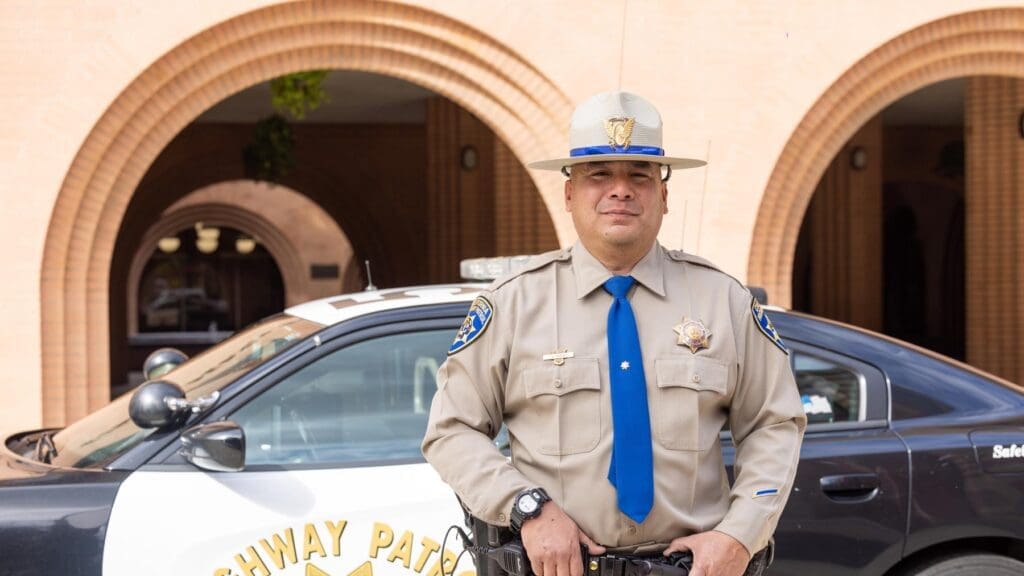
Undergraduate Degree in Gerontology Provides Access, Credibility
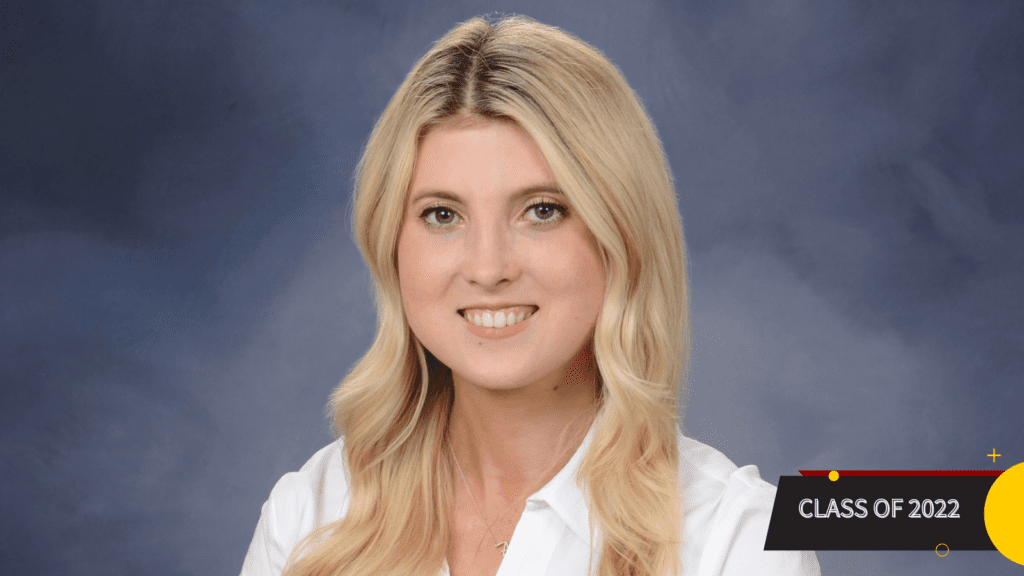
A gerontology graduate learns prevention is the best medicine. Alexandra Firestone plans to become a doctor and to promote healthy habits for all ages

Q&A with Bachelor’s in Lifespan Health grad Astoria Ho
Leonard Davis School of Gerontology 3715 McClintock Avenue Los Angeles, CA 90089

Privacy Notice Notice of Non-Discrimination Digital Accessibility
- How to Give
- What is Gerontology?
- Our Expertise
- Faculty & Staff Portal
- Honors and Awards
- Publications
- Resources for Journalists
- Undergraduate Programs
- Master’s Programs
- Certificate Programs
- PhD Programs
- Professional Education
- Twitter / X
© 2024 USC Leonard Davis School of Gerontology.
- About Us Our mission to promote healthy aging for diverse people, communities and societies is more vital than ever.
- Partnerships
- Diversity, Equity and Inclusion
- Board of Councilors
- Gerontology Careers
- Our Gerontology Expertise
- Andrus Gerontology Center
- Sophie Davis Art Gallery
- Administrative Staff
- Gerontology Directory
- Employee Resources
- Jobs at USC Leonard Davis
- Admission Our students come from around the world and from many walks of life, and they’re all here for unique, important reasons.
- Undergraduate Applicants
- Master’s Applicants
- PhD Applicants
- Graduate Certificate Applicants
- Doctorate of Longevity Arts and Sciences Applicants
- International Applicants
- Online Education
- Request Information
- How to Apply
- Newly Admitted
- Tuition and Financial Aid
- Frequently Asked Questions
- Office Hours
- Academics At the USC Leonard Davis School, you can earn an undergraduate gerontology degree, an accelerated five-year undergraduate or graduate degree program, a doctoral degree, or a minor in aging.
- Human Development and Aging (BS)
- Lifespan Health (BS)
- Minor in Gerontology: Individuals, Societies, and Aging
- Minor in Gerontology: Science, Health, and Aging
- Minor in Geroscience
- Aging Services Management (MA)
- Applied Technology and Aging (MS)
- Gerontology (MS)
- Gerontology (MA)
- Long Term Care Administration (MA)
- Medical Gerontology (MA)
- Senior Living Hospitality (MA)
- Specialized Master’s Programs
- Foodservice Management and Dietetics (MA)
- Nutrition, Healthspan and Longevity (MS)
- Lifespan, Nutrition and Dietetics (MS)
- Nutritional Science (MS)
- Graduate Certificate in Gerontology
- Doctorate of Longevity Arts and Sciences
- PhD in Gerontology
- PhD in Geroscience
- Academic Advisement
- Career Development
- Advisement FAQs
- Students Students of the USC Leonard Davis School of Gerontology share a deep compassion, an inspiring enthusiasm and a vision of an improved quality of life for older adults.
- Undergraduate and Graduate Students
- PhD Students
- Internships
- MSNHL Supervised Practice
- Research Opportunities
- Academic Conduct
- Student Organizations
- Study Abroad
- Alumni Stories
- Finding Support
- Resources Overview
- Student Handbooks
- Course Catalogue
- Schedule of Classes
- Academic Calendar
- USC Student Affairs
- USC Student Health Center
- School Faculty
- Alphabetical Directory
- Institutes and Centers
- Projects and Initiatives
- Multidisciplinary Colloquium Series
- Research Funding Awards
- Research Events
- COVID-19 News
- Stay Connected
- Event Calendar
- USC FightOnline
- Support the USC Leonard Davis School
- Giving Priorities
- Join the Dean’s Circle
- Contact the Development Office
- Podcast: Lessons in Lifespan Health
- Vitality Magazine

University of Southern California
Proposals are solicited from USC faculty in all disciplines to support undergraduate students as members of faculty research teams. Proposals may be submitted by individual faculty members or by groups. Limited funding may also be available as matching funds for departmental undergraduate research initiatives.
Projects may be proposed for individual students or for student teams. Within specific proposals, members of a faculty group may choose to work individually with students and share responsibility for the group components of the project (see below). Special consideration will be given to proposals that supplement existing external grants in order to support undergraduate researchers.
Funding is not provided for students registered in directed research courses, Progressive Degree students, for graduate research assistants, or for projects in which undergraduate researchers will be supervised exclusively by graduate students.
- Students will be paid in the form of research stipends, which are regarded as merit-based financial aid. The standard stipend for an academic semester is $1,500, assuming an average of eight to ten hours of student research per week. The standard summer stipend is $3,000, assuming an average of at least twenty hours of student research per week for at least eight weeks. Awards per proposal are limited to a maximum of $6,000 (limited to $3000 per student per academic year) . Please note that students hired as undergraduate researchers in this program cannot simultaneously receive additional funding from the USC Provost’s Research Fellowship, Student Opportunities for Academic Research program (SOAR) or Summer Undergraduate Research Fund (SURF).
- The period covered by the current Call for Proposals is July 2024 through June 2025. Student stipends will be disbursed by the Office of Academic Programs, and all stipends must be paid by the end of the Spring 2025 semester. Faculty members who hire students for summer research (May and June 2025) must submit student information by the end of April 2025.
- In addition to students’ individual involvement in research activities, projects should generally include some regular integrative or group activity. Examples of such activities are research seminars, colloquia, and participation in regional or national conferences. As part of their research experience, students are expected to receive training in ethical issues (e.g., human subjects training where appropriate) and in relevant forms of information retrieval and scholarly communication.
- Each undergraduate research project should culminate with an appropriate report of the completed work (for example, a formal research paper, poster presentation, or similar demonstration of scholarly or creative accomplishments). All examples of student work should be submitted to the Office of Academic Programs before the end of the Spring 2024 semester. Failure to submit a research report will result in ineligibility for future funding.
- Progressive Degree students are ineligible to receive URAP funds.
Funding Criteria
A faculty panel will review proposals and funding decisions will be made on the basis of the following criteria:
- The quality of the proposed research project.
- The level of educational benefit to the undergraduate research assistants.
- Proposing faculty’s previous experience working with undergraduates, particularly in a research and/or collaborative environment.
- The extent to which the project involves collaboration among faculty, particularly across academic units and/or disciplines.
Proposals that are project-based extensions of existing courses are not likely to be funded.
At least 90% of the project budget must be devoted to student research stipends.
At most 10% of the budget may be for materials and supplies.
USC Undergraduate Research Associates Program
Jan 2 2024 12:00 am (pst), feb 23 2024 04:00 pm (pst).
What are you looking for?
Justin Gaither analyzes biomechanics data recorded from runner Ian Russell. (USC Photo/Gus Ruelas)
USC program creates research pathways for undergrads in science, tech and engineering
The Geobiology and Genomics Undergraduate Research Experiences program boosts diversity, helping students learn they can have stimulating experiences in research labs
Kids dream of jobs in monochromelike simplicity: “When I grow up, I want to be a doctor or firefighter or pop star!”
Maturity reveals career pathways in full color — a process that USC promotes for underrepresented students under a program to advance science careers. Beyond becoming an astronaut or lawyer or basketball player, USC steers students to work in, say, nanorobotics or microfluidics or geobiology.
“We’re trying to grow scientists,” said Steven Finkel , professor of biological sciences at the USC Dornsife College of Letters, Arts and Sciences .
Finkel leads the Geobiology and Genomics Undergraduate Research Experiences program. About 30 students are enrolled this year. In the past 14 years, more than 160 students have participated.
This is more than a what-color-is-your-parachute job quest for students. The program aspires to change the complexion of higher education while transforming cultural perceptions of college studies.
The program accepts undergraduate students, with emphasis on underrepresented and first-generation students, a strategic calculation so tomorrow’s scientists become more diverse than today’s. Broadening access to research in higher education helps change the student body, create access to high-quality research opportunities and build a pipeline of professionals who can one day step into faculty leadership roles.
This is a pathway to a career that they might not have expected. Michael Quick
“This program helps undergraduate students learn that they can have challenging, stimulating experiences in research labs,” said USC Provost Michael Quick. “This is a pathway to a career that they might not have expected.”
What’s needed are pathways students can follow toward careers in science, engineering and technology. Said Finkel: “To increase diversity in the ranks of science, we’ve got to get students when they’re young. We want them to discover there are other potential career pathways in research in addition to more traditionally understood health professions.”
Undergraduate research: access and opportunity
Increasing access and opportunities are top priorities for USC. Recently released student and faculty diversity numbers provide a gauge for measuring the university’s results. USC earns high marks for enrolling more minority students than any other private institution in the Association of American Universities. USC also leads the nation’s universities in enrolling the most underrepresented minority graduate students.
The program offers inducements of curiosity and cash. First, students have liberty to seek out many labs to work in. It takes initiative and imagination for a 20-year-old with little or no formal laboratory experience to prove how they will contribute to a research team.
Second, the program pays students for the hours they spend doing research in labs. On average, Finkel said they make about $17 per hour and work about 13 hours per week or more during summertime — among the highest paid undergrads working at USC.
Research program opens a whole new world
Justin Gaither joined the program. He attended Grover Cleveland Charter High School in Reseda and Glendale Community College before transferring to USC. He’s passionate about sports, especially basketball. He had heard of biomechanics before USC, but didn’t know much about it.
“I wanted to get into sports, sports engineering or exercise science, maybe working with athletes or sportswear companies,” Gaither said. “I thought jobs like this were niche, just one or two, but this program opened a whole new world of opportunity for me.”
After a stint in community college, Gaither transferred to USC, connected with a mentor in the Black Alumni Association, who linked him to the program. Soon, he began working in the Biomechanics Research Laboratory run by Jill McNitt-Gray, professor of biological sciences and biomedical engineering at the USC Dornsife College of Letters, Arts and Sciences and the USC Viterbi School of Engineering.
A lab for athletes and artists
Tucked within the physical education building, the lab is a fusion of sweat, high-tech gear and rehabilitation. It is mix of nutrition, physiology, strength and conditioning, data analytics, sports medicine and psychology. People who come here include wounded military veterans. Dancers explore ways to channel energy to motion for peak performance. Basketball players work on perfecting their free throws. This is where Gaither works.
Gaither spends three days a week in the lab, working up to six hours per session. Among those who frequent the lab are Olympic athletes, NCAA athletes and performing artists. He works hands-on with patients and does research under the supervision of McNitt-Gray. He affixes sensors on their bodies to record motion, linking to a computer model and replicating motions over and over to observe how the body responds. He’s helped USC athletes gain peak performance and people in wheelchairs build locomotion.
“This is how they get started,” McNitt-Gray said. “We get them involved, progress it and get skills they need to get out and get jobs.”
Gaither said the program has helped him think about his future in new ways.
“I’ve seen this on ESPN and now I get to do it and it’s so cool,” Gaither said. “It opened my eyes with what I can do in engineering, and I can see how it is applied to different kinds of careers.”
The program is important to show families the value of higher education, too. Many of the minority undergraduates at USC are first-generation students, which comprised about 17 percent of the class of 2021, according to the USC Office of Admission. About two-thirds of last year’s incoming freshman class are students of color. Sometimes, families question the value of time spent in a research lab versus volunteering or working in a medical clinic, Finkel said. So, by paying students to work in labs, it demonstrates research has value as a career option.
Mom finds proper motivation for her son
Xavier Garcia will receive his degree in health and human sciences this month. It has been a long journey. USC’s research program helped him on the way.
He is the first person in his family to go to college. That achievement exceeds his mother’s expectations. She was satisfied he graduated high school. That’s where his journey began.
Garcia grew up in Sacramento and wanted to be a doctor, but he was a poor high school student, not for lack of smarts, but lack of initiative. He often skipped school and homework and mixed with the wrong crowd. He assured his mother, a single mother of four, that everything was OK, and she believed him. It wasn’t. He barely graduated with a D-average.
Next, he went to community college, where he had all but given up on his dream of being a doctor.
“My goal was impossible. How could I compete and go to Harvard or a big medical school when I’m in community college and undervalued?” he said.
His mom told him about a friend, a successful doctor who also once attended community college. That story motivated him.
“I thought, ‘if he can do it, then I can do it, too!’” Except the story was a fiction his mom created to motivate her son. It worked. Xavier worked three jobs to pay the bills and support his mother while sending himself to college.
My goal was impossible. How could I compete and go to Harvard or a big medical school when I’m in community college and undervalued? Xavier Garcia
He pulled grades good enough to transfer to USC. When he got here, he realized he lagged in research experience. He needed to spend more time in laboratories while working to pay for school and support the family. He needed a solution. Enter the Geobiology and Genomics Undergraduate Research Experiences program.
Garcia heard about the program from other USC students, he applied and was accepted. He joined the Anat Erdreich-Epstein lab at Children’s Hospital Los Angeles, an affiliate of the Keck School of Medicine of USC. Soon, he was using confocal microscopy to visualize the results of tagging a gene that suppresses brain tumors. And he got paid to do it, since the program paid students for time spent in research lab. So he gained valuable experience, maintained focus on studies and helped pay the bills.
“If it wasn’t for this program, I wouldn’t have been able to do research. I’m still amazed that I get to do things I love. I get paid and I get to help my family at the same time,” he said.
USC undergraduate research has prompt payoff
Jada Hislop came to USC from Georgia, the first person in her family to attend college. She began in a work-study program in molecular and computational biology at USC and joined the undergraduate program soon after. She works in a lab that studies brain responses to sweeteners, including neuroimaging at the Brain and Creativity Institute. She said the program is important because it shows that research experience benefits students immediately, not just after graduation.
“Having those paid research hours each week is very meaningful. If I’m being funded, it means I can be that much more focused on my projects than if I had to work an outside job,” Hislop said.
Still, her family doesn’t fully grasp the university experience. For example, she said her father, who didn’t go to college, struggles to understand what she does at USC.
“My dad has no idea what I do, and I’ve explained it a hundred times,” Hislop said. “He supports me, but it’s hard for him to understand, like it isn’t real. One time, I went to the National Institutes of Health for research, and when they sent him the form in the mail, he said, ‘I thought you were volunteering at the hospital.’ I explained I was working in a lab at the NIH, that I wasn’t at some hospital working in the gift shop.”
Today, USC’s undergraduate program is undergoing change. It was originally funded by an NIH-funded Center for Excellence in Genomic Science program aimed at students from underrepresented backgrounds, Finkel explained. Today it is funded jointly by the Center for Dark Energy Biosphere Investigations (C-DEBI), a National Science Foundation-funded program with focus on the deep ocean, along with the USC Office of the Provost.
Related Articles
Once unhoused and despite a family loss, usc dornsife grad is headed to law school, commencement recap, age-related brain changes influence recovery after stroke.

Admission & Student Engagement Current Undergraduate Students
- Registration
- Freshman Academy
- Academic Support
Viterbi Research Programs
Published on November 5th, 2021
Last updated on August 28th, 2023
- Grand Challenges Scholars Program
- W.V.T. Rusch Undergraduate Engineering Honors Program
- Min Family Engineering Social Entrepreneurship Challenge
- Viterbi International Programs
- Internships & Co-Ops
- Professional Development Workshops
- Career & Internship Events
- Industry & Career Exploration
- Online Toolkit
- First Destinations
- Grad School Exploration
- Progressive Degree Program
- Student Organizations
- Viterbi Impact
- PK-12 Outreach Opportunities
- Center for Engineering Diversity
- Women in Engineering
- Advisory Boards
- Financial Aid & Scholarships
Academic Resources
Co-curricular opportunities, career connections, graduate school.
What are you looking for?
Suggested searches.
- Majors & Minors
Undergraduate Study
Setting yourself up for success begins with considering all your options. At USC, a community is waiting to help you build your path to your future. Work across disciplines with leading experts and supportive faculty that will make you rethink what learning means. Cross the globe with our dynamic, global community or spend your days on campus. The Trojan Family will embrace you as you are.
More Than Just the Numbers
USC combines the personal attention of a private school with the scale of a public one. With 23 academic schools and divisions to choose from, there are countless combination of tracks to pursue. And with an in-class student-to-faculty ratio that rivals many small liberal arts colleges, students can get the attention they deserve in the midst of a thriving community of like-minded students.
Majors and Minors
Student-to-Faculty Ratio
Undergraduates
Undergraduate Majors & Minors
Get a feel for what an undergraduate degree can look like for you. With more than 23 schools and divisions to choose from, you will have a unique learning experience you can’t get anywhere else.
The Undergrad Experience
Explore, test, challenge. Defining who you are is a process of finding new ideas and experiencing opportunities. At USC, you will find different perspectives, experience new cultures and ultimately uncover a few things about yourself along the way.
First-Year Experience
Interdisciplinary freedom, global experiences, advising & support.
With all the opportunities USC has to offer, your choices can become overwhelming. You’re not alone. As part of the Trojan Family, you have an entire community of faculty, staff and fellow students. Take advantage of learning strategy sessions, counselors that will guide you through personal and academic challenges, advisers who can help map your path forward and other support systems that are ready to help.
Undergraduate Research Opportunities
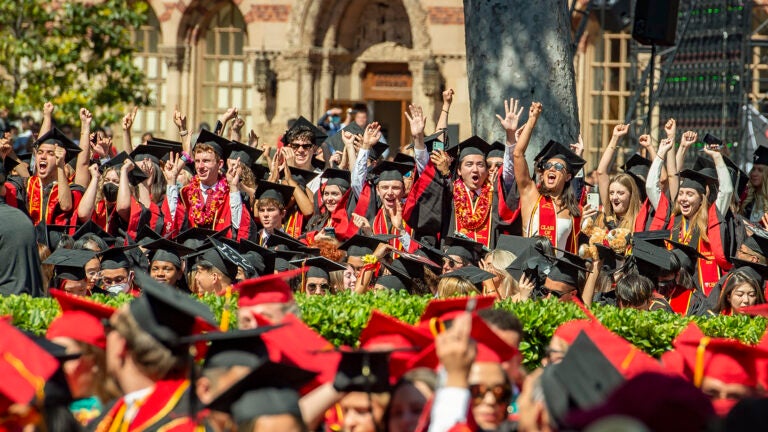
Discovery Scholars
This signature program honors students who engage in undergraduate research or artistic endeavor with faculty guidance. Be recognized for making a contribution to your field of study as an undergraduate.
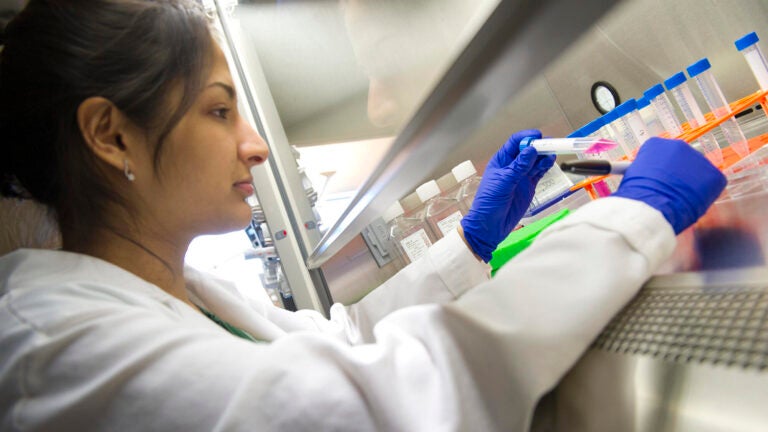
Research Programs By School
USC schools encourage the Discovery Scholar ideal of undergraduate research with programs of their own. See what’s available in your area of study.
- Directed Research (490)
- USC Marshall School of Business
- USC School of Cinematic Arts
- USC Annenberg School for Communication and Journalism
- USC Viterbi School of Engineering
- USC Dornsife College of Letters, Arts and Sciences
- Keck School of Medicine of USC
- USC Sol Price School of Public Policy
- More Opportunities
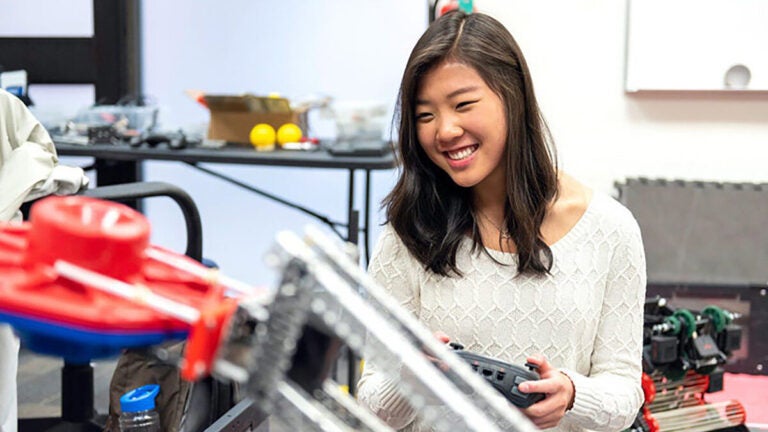
Women in Science and Engineering (WiSE)
This program is a groundbreaking effort to increase the representation and success of women in the sciences and engineering at USC through research grants, events, lecture series and outreach.
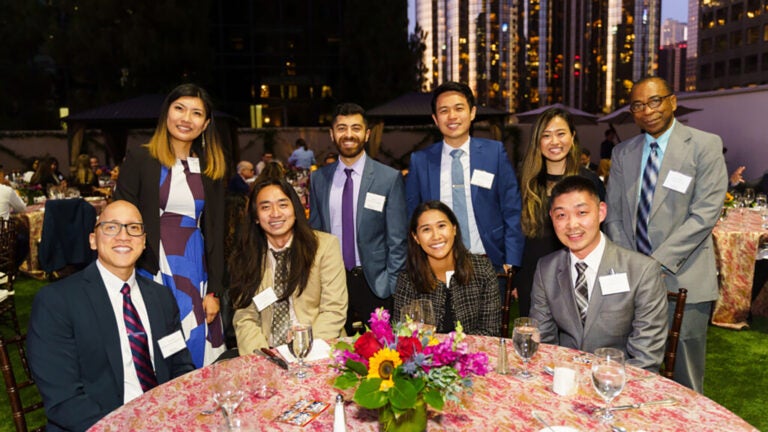
- Children’s Hospital Los Angeles Medical Preceptorship Program
This program is for pre-medical students interested in learning more about pediatric medicine. Students will shadow physicians at Children’s Hospital Los Angeles after commencement.
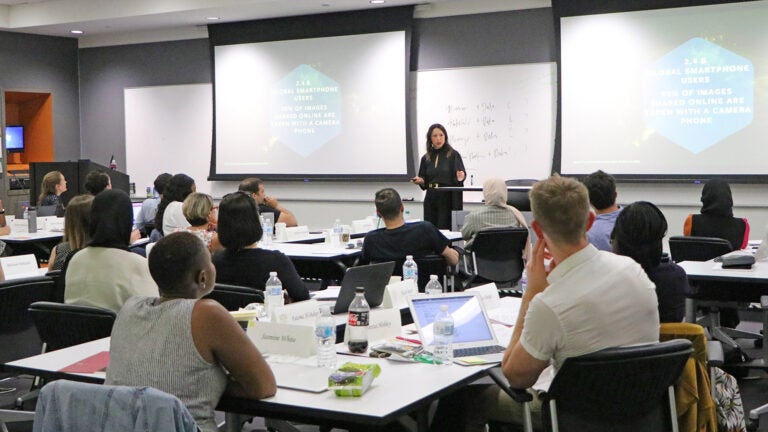

USC Research Gateway Scholars Program
A program that encourages low-income and first-generation college students as well as students from historically underrepresented ethnic groups to pursue graduate studies and consider an academic career.
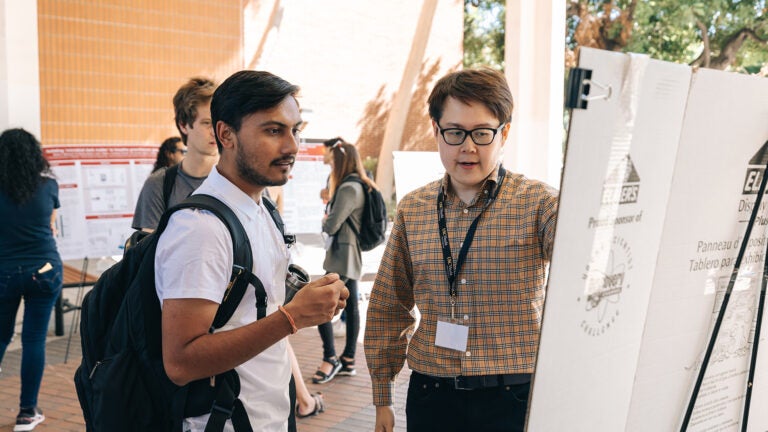
Undergraduate Symposium for Scholarly & Creative Work
The Undergraduate Symposium provides students with the unique opportunity to exhibit and share examples of their significant research and creativity with the university community.
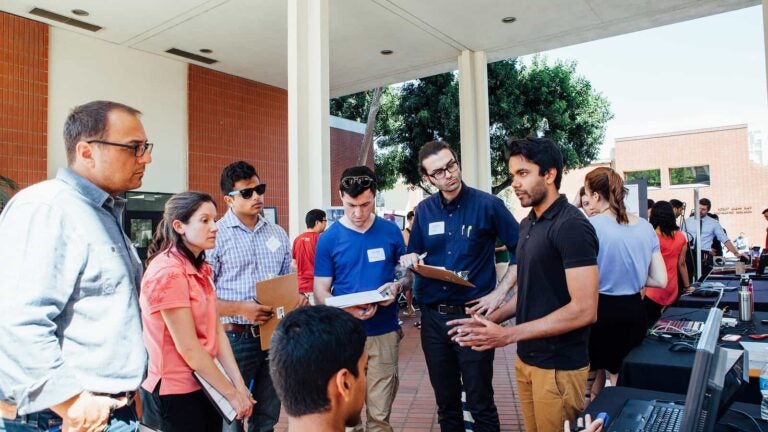
Fellowships and Funding
Several fellowship opportunities provide financial support for students interested in conducting and presenting research as undergraduates. Check out these possibilities:
- USC Provost’s Undergraduate Research Fellowships
- Bridge Institute Undergrad Science (BUGS) Intensive Summer Research Program
- Center for Undergraduate Research in Viterbi Engineering (CURVE) Fellowship – Viterbi School of Engineering
- Student Opportunities for Academic Research (SOAR) – Dornsife College
- Summer Undergraduate Research Fund (SURF) – Dornsife College
- USG Academic Research Fund
- Undergraduate Programs Conference Travel Grants
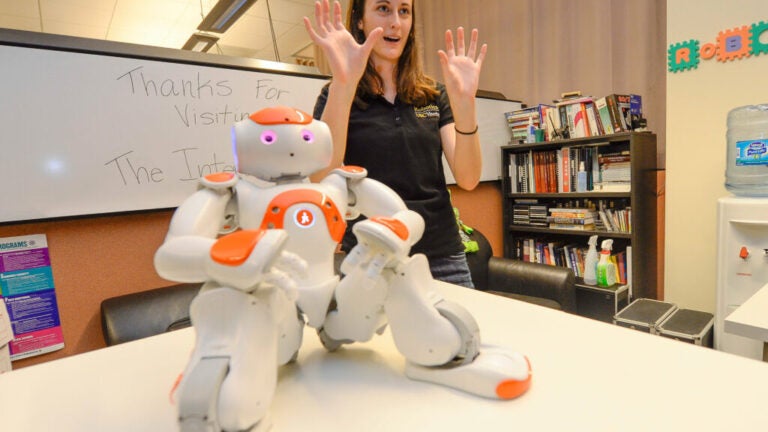
Research Centers
Explore USC’s diverse research centers and institutes spanning arts, humanities, social and natural sciences, engineering, technology, and even an Institute for Innovation.
- Centers and Institutes
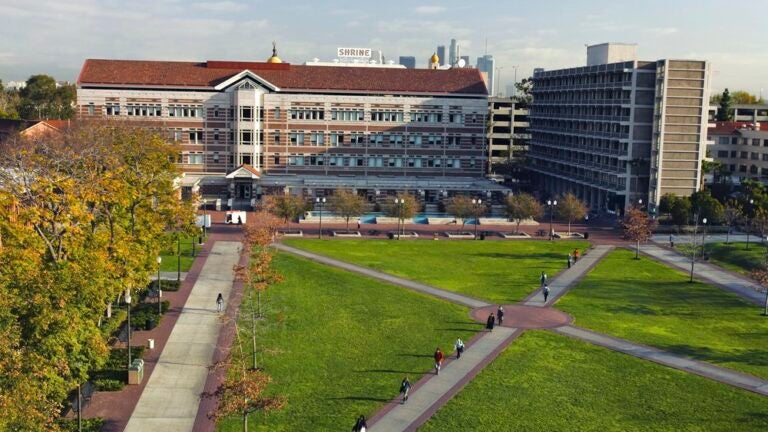
Library Resources
The USC Libraries actively support and encourage academic endeavors with 23 libraries, information centers, the USC Digital Library, and numerous e-journals. Searching for understanding? Begin your search here.
- USC Libraries
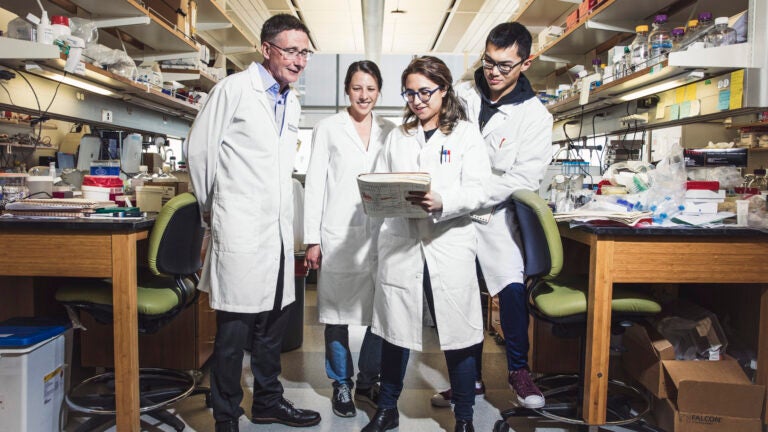
Working with Faculty
To engage in research, students should connect with current experts in the field – members of the USC faculty. Explore faculty directories and profiles to discover research activities campus-wide.
- Dornsife College of Letters, Arts and Sciences – Department Rosters
- Marshall School of Business – Faculty Profiles
- Programs in Biomedical and Biological Sciences (PIBBS)
- Viterbi School of Engineering – Faculty Directories
- USC Experts Directory
- USC Health Sciences – Researcher Profiles
Academic Honors and Fellowships
USC is committed to supporting students in their pursuit of transformative academic experiences. The Academic Honors & Fellowships office offers personalized advisement, impactful programming, and valuable resources to facilitate the exploration and achievement of high-impact experiential learning opportunities.
By collaborating with USC faculty, staff, and alumni, the office provides support to applicants as they navigate fellowship processes, offering evaluation, endorsement and constructive feedback.
Commencement Honors
External scholarships and fellowships, signature events, learning in the world.
We create, innovate, challenge and build new knowledge that affects lives today — as we prepare our students to change tomorrow’s world for the better. With undergraduate education and graduate degree programs across 23 schools and divisions, USC offers a community of scholars that spans the globe and cares for its city: Los Angeles.
Sometimes the best classrooms have no walls. With roughly 275 sunny days per year, Los Angeles provides the perfect environment for outdoor learning and living.
USC students in the new course “An exploration of America’s National Parks”, went camping in Joshua Tree to get a first hand experience of our national parks! Douglas Noble, an associate professor of architecture, created the course “An Exploration of America’s National Parks,” which is available to students from all majors. Noble wants students to approach their research projects from their own unique perspectives through a class for all who are passionate about preserving national parks.
USC Dornsife students have multiple opportunities to participate in field research just as these students are doing at the USC Wrigley Institute for Environmental Studies located on Santa Catalina Island.
USC students filming outside of the Cinematic Arts complex at USC.
There is no substitute for real world experience, and USC students have exceptional opportunities to pursue their studies in real working environments. On a remote volcano slope in Hawaii, Adriana Blachowicz PhD ’19 studied how fungi — and humans — might fare on other planets.
Technology & Society
New technologies change the ways we express ourselves, communicate, conduct research, engage in politics and even how we learn. From the visual arts to literature to engineering, you’ll explore new technologies and emerging forms of literacy. Learn more about what we mean.
Honors in Multimedia Scholarship
Stay ahead of the curve when it comes to new technologies with this innovative four-year honors option. The curriculum lets you integrate multimedia into your major and/or minor studies and graduate with honors on your transcript.
Media Arts + Practice
Literacy can take many forms in the 21st century. MAP is dedicated to exploring these new forms of media and understanding how to use them effectively. Learn more about how your proficiency in multimedia can influence your powers of communication and self-expression.
Minors and Certificates from the Information Technology Program (ITP)
The online world is now part of the fabric of our everyday work and personal lives. From social media to email to Google, our lives are all becoming more digital. This digital presence is the universal driving force of change in our lives. The knowledge of how the internet is leveraged is critical for every USC student.
Keep Exploring
- Creative Expression
- Living Learning Communities
- Service Learning
- Request Information
- Apply to USC
WHAT ARE YOU LOOKING FOR?
Key searches, meet mika ishii: 2024 undergraduate student speaker and global health graduate.
Mika Ishii earns her Bachelor of Science in Global Health and minor in Natural Sciences from USC.
(Photo courtesy Mika Ishii)
“Every “first” that year felt really special!”’~Mika Ishii
In 2020, Mika Ishii started her freshman year online, signing-in from her hometown in Hawaii. “All my classes were on Zoom, and it was really difficult—especially with the time difference,” she says. Ishii, a recipient of the Presidential Scholarship , initially started at USC as an economics major and outside of class, she joined the USC Trojan Marching Band as a member of the alto saxophone section. “I was able to meet really great friends through this experience and it gave me a sense of community during the pandemic,” she explains.
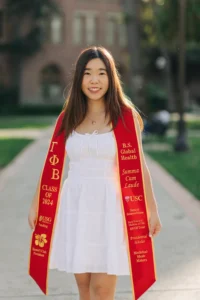
The following year, Ishii relocated to Los Angeles and began her sophomore year at University Park Campus—which she says felt more like her freshman year. She moved into the residential college suites and finally put a face to the names of students she had met virtually the prior year. “It was nice to meet everybody for the first time and talk to them in-person,” she recalls. “Whether it was watching football games with my friends and witnessing school spirit or playing with the Trojan Marching Band at a basketball game and hearing that sound live—every “first” that year felt really special.”
On campus, she switched her major. “The moment I took Dr. Wipfli’s class ‘Introduction to Global Health’, I knew that global health was the right major for me, and I decided to pursue a career in medicine,” she reveals. “I have really enjoyed combining the social and natural sciences and taking courses ranging from international relations and economics to health promotion. They have provided me with a way to see different aspects of the world—whether that’s connecting economic trends or learning about globalization and policy, I learned how systemic issues can affect health,” she remarks.
During her time at USC, Ishii participated in the USC GRIT Lab led by Director of Undergraduate Programs Heather Wipfli, PhD , where she conducted drowning prevention research in Uganda. “What drew me to this work is the fact that I’m from Hawaii and we’re surrounded by the ocean, so I’ve grown up understanding how important it is to learn about swimming and water safety,” she affirms. “I have taken so many classes with Dr. Wipfli and have learned so much from conducting research with her. She has really inspired me as a mentor. The same is also true for Dr. Panayiota Courelli who has helped me with career development and given me great advice.”
Outside the program, Ishii was involved in the USC Undergraduate Student Government for four years. In her role as associate director for the performing, visual arts, and cultural funds, she helped students finance a variety of projects from theatre productions to cultural events. “This experience is something I really enjoyed because students may otherwise not have been able to produce events for their communities. It’s been my way to help the larger Trojan family,” she says.
Ishii has also been involved with several organizations volunteering her time and efforts to the Luskin Orthopaedic Institute for Children, Medicinal Music Makers, and tutoring other students in the global health program. “What I am most proud of during my time here is being able to impact people, whether that has been on campus or across the greater Los Angeles area.”
Away from USC, Ishii interned at the University of Hawaii Cancer Center looking at cancer disparities through clinical trials. “I became interested in this research because of its global health focus. It provided me an opportunity to apply what I had learned at USC, through my research and statistics classes, to a real-life study,” she indicates.
After graduation, Ishii intends to conduct research before applying to medical school. Thereafter, she hopes to address health disparities in her community in Hawaii. “I want to make a positive impact on the world and hope to use the knowledge that I gained in this program to help those across the islands where there are not enough healthcare workers or doctors,” she maintains.
Looking back on the last four years she reflects, “this program is really great, and it has wonderful faculty, staff, and students who all share a similar goal of making a positive impact on the world.” She advises other students to find the joy in life and appreciate the little moments, because it goes by so fast. She concludes by saying, “take what you receive from this program and give back to your own community—because I think that is really important!”
- Campus News
- Population and Public Health Sciences
- PPHS Alumni
- Undergraduate Programs
Office of Research and Innovation Continues to Promote Interdisciplinary Startups via USC and Techstars Startup Weekend
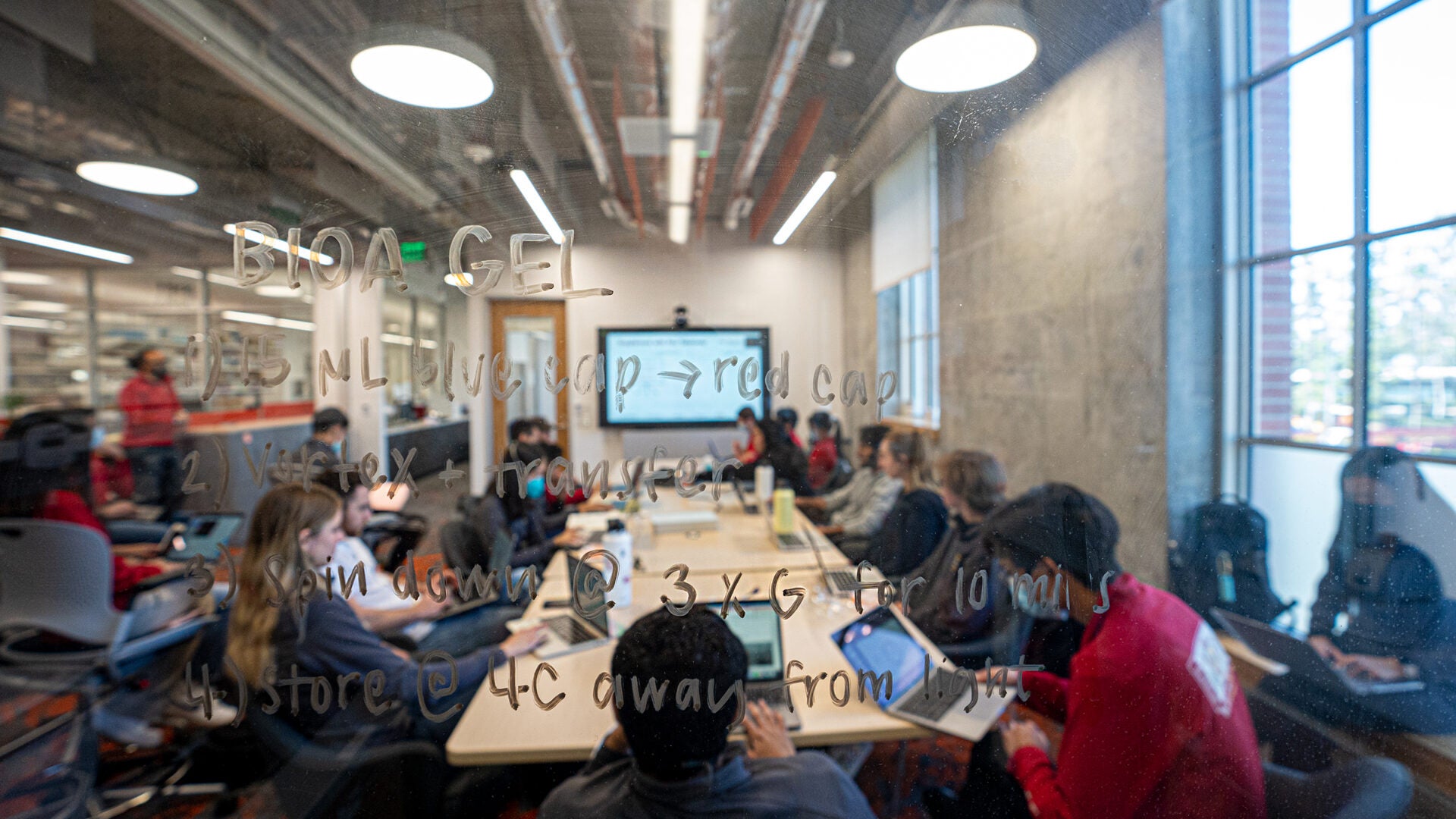
The inaugural event of the USC and Techstars Digital Economy Program took place the first weekend in April, serving as the kick-off for the newly announced partnership. The USC and Techstars Digital Economy Program is focused on startups working on digital advancement across bioscience, biomedicine, physical science, engineering, information, and computer sciences. The first event, Startup Weekend, invited participants to meet and network with mentors, investors, co-founders, and sponsors to help launch their entrepreneurial journey over the course of the 3-day event, starting on April 5 th with idea pitches and team formations. The participating teams in Startup Weekend featured participants from multiple USC schools, including: USC Iovine and Young Academy (IYA), USC Dana and David Dornsife College of Letters, Arts, and Sciences, USC Marshall School of Business, USC Viterbi School of Engineering, USC Alfred E. Mann School of Pharmacy and Pharmaceutical Sciences, Keck School of Medicine of USC, USC Chan Division of Occupational Science and Occupational Therapy, USC Sol Price School of Public Policy, and the USC School of Cinematic Arts. The event wrapped up on Sunday, April 7 th with teams giving final pitches, and first, second, and third-place honors awarded. Overall, Startup Weekend included 48 active participants, 26 of whom were undergraduate, graduate, or doctoral students at USC.
The first-place team, Momentum , included doctoral, graduate, and undergraduate students; team members were Evans Pope III, from the USC Alfred E. Mann School of Pharmacy and Pharmaceutical Sciences, Henry Groome, from USC Iovine and Young Academy, Isaiah Eruaga from the Keck School of Medicine of USC, and Julian Tedja, Rex Ordonez, and Jessie Tran, all of whom are from USC Marshall School of Business.
The second-place team, ProperlyAI , similarly boasted doctoral, graduate, and undergraduate students; team members were Adrianna Wilson, from USC Iovine and Young Academy, Stuti Chakrabordhy, from the USC Chan Division of Occupational Science and Occupational Therapy, and two UC San Diego students, Aarav Khanduja, and Vedant Rao.
The third-place team, Clean Dorm , included graduate and undergraduate students, as well as USC Alumni; team members were Valeria Gamez and Diya Shah, both from the USC Viterbi School of Engineering, Monique Simpson, from the USC Dana and David Dornsife College of Letters, Arts and Sciences, Cheikh Gueye, a USC alum, Ace Yeck, a current student at Loyola Marymount University, and Axel Amor.
The event provided an opportunity for participants to not only expand their networks but also to see the immense value of multidisciplinary collaborative efforts. “This was a fantastic way of bringing together our students, faculty, and alumni, and providing the opportunity and space for them to network and put their creativity to work,” said Dr. Steven Moldin, Associate Vice President of Research Strategy and Innovation, “we could not be happier with the outcome of the weekend event and look forward to seeing how the partnership with Techstars continues to grow and expand.”
The USC and Techstars Digital Economy Program has recently opened applications to the University Catalyst Program, which provides early-stage founders with startup education, mentorship, and access to the Techstars network. Theprimarily virtual program will take place from September through November, with some in-person components. Participants will have access to virtual masterclasses with a focus on pitch coaching and pitch deck development, 1:1 mentoring through the Techstars network, and peer opportunities. All entrepreneurs are encouraged to apply and there will be a concerted effort to support startups affiliated with the USC community, including students, alumni, and faculty/staff. For more information, click here.
What are you looking for?
Suggested search, 2024 los angeles immigration summit.
The 5th Annual Los Angeles Immigration Summit is a two-day, in-person convening that bolsters the power of L.A.’s immigrant communities. The 2024 Summit theme is: “Leading a Bold, Just, and Inclusive Democracy.”
When : July 11 & 12, 2024 Location : Los Angeles Trade-Technical College (LATTC) 400 W Washington Blvd Los Angeles, CA 90015
The Summit will spotlight the remarkable strides made across California and Los Angeles County to advance immigrant integration and inclusion by convening cross-sector partners, immigrant inclusion advocates, community leaders, philanthropy, elected officials, academia, and media partners for dynamic conversations, immersive learning sessions and scenario planning. Through collaborative dialogue and knowledge-sharing, attendees will learn about the radiating impacts across the region and state, explore innovative approaches and best practices aimed at advancing immigrant inclusion and opportunities to forge a path forward locally and nationally.
The agenda and additional details will be updated soon.
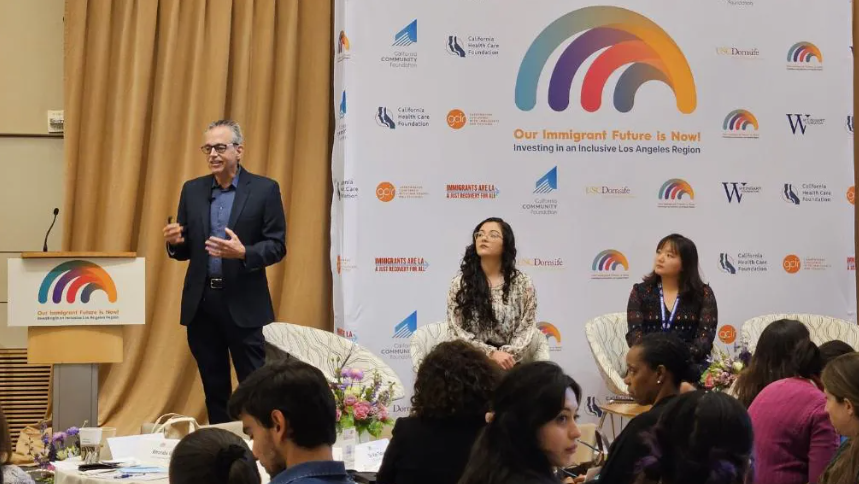
What to Expect
The Summit will include two full-days of informative and engaging plenary sessions and panel discussions that center immigrant voices and showcase intersectionality across issues. Topics will include economic, health and educational equity, racial solidarity, nonprofit sustainability, and more. There will also be intentional opportunities for networking and connecting, including meals.
The Summit also serves as the annual release of the State of Immigrants in Los Angeles County (SOILA) report by the USC Equity Research Institute (ERI). The report will unveil data on how immigrants in LA County are faring to refocus the attention on how key players in Los Angeles can continue advancing a pro immigrant agenda. Both the Summit and the SOILA report are a collaborative effort between the California Community Foundation, the USC ERI, the Council on Immigrant Inclusion, and the Immigrants Are LA coalition, that includes stakeholders from business, labor, community-based organizations, local government, funders, and other sectors.
Explore other articles
A new look for eri’s website, unpaved: greening the urban jungle with dr. manuel pastor and sissy trinh | the coolest show, statement of support for students from usc equity research institute, advancing green space equity via policy change: a scoping review and research agenda.

Parting Thoughts as Eight ISI Graduate Research Assistants Earn their Doctoral Degrees
Isi celebrated the 2024 gra grads with cake, swag, and well wishes..

Photo Credit: Angel Itua/USC-ISI
“It’s been an amazing journey,” said Basel Shbita , a newly minted Ph.D. who worked as a Graduate Research Assistant at USC’s Information Sciences Institute (ISI). On Thursday, May 9th, ISIers in the Marina del Rey office gathered to celebrate the Spring 2024 GRA graduates, including eight who graduated with doctoral degrees, and two masters students.

Basel Shbita, Craig Knoblock, Binh Vu / Photo Credit: Angel Itua/USC-ISI
Craig Knoblock , the Keston Executive Director of USC’s Information Sciences Institute kicked off the event with opening remarks, and led the faculty advisors in giving touching tributes about the new grads. And the graduates themselves had plenty to say about their time at ISI.
Shbita described how obtaining his Ph.D. has impacted him: “The Ph.D. itself is an amazing journey that really matures you and makes you think differently. And I think that’s part of becoming a researcher. Now I get it!” He continued, “ISI is a unique place that brings a lot of different experiences together. To me, it’s truly the best incubator in the world.”

Jay Pujara, Avijit Thawani / Photo Credit: Angel Itua/USC-ISI
Pei Zhou recalled his first time at ISI, and being struck by the view, a sentiment shared by many. Beyond the boats and sunset, Zhou said he appreciated the freedom he had at ISI to choose his research problems.

Yilei Zeng / Photo Credit: Angel Itua/USC-ISI
Avijit Thawani said, “ISI offers so much more than what other Ph.D. programs have to offer. There is campus, where you can attend classes and have classmates and work with people. But you also have this space at ISI full of amazing people working on stuff as big as quantum computing and launching space shuttles!”
Some of the grads took surprising paths on their journeys. Yilea Zeng said, “When I started at ISI – focusing on computational social science – I never dreamed I would end up in the gaming industry. But it has been such a fun Ph.D. because I have legit reasons to play games while I’m doing it!”

Luca Luceri, Julie Jiang / Photo Credit: Angel Itua/USC-ISI
Julie Jiang, recently included in the Forbes 30 Under 30 in Science list and off to a job at Meta summed up her five year Ph.D. journey at ISI: “We did cool research and we went to cool happy hours.”
As the ceremony drew to a close, one could feel both nostalgia and anticipation for the next chapter in each graduate’s journey. These students, who’ve spent years in the halls of ISI, where curiosity knows no bounds, are now poised to embark on new adventures and shape the future of science and innovation.
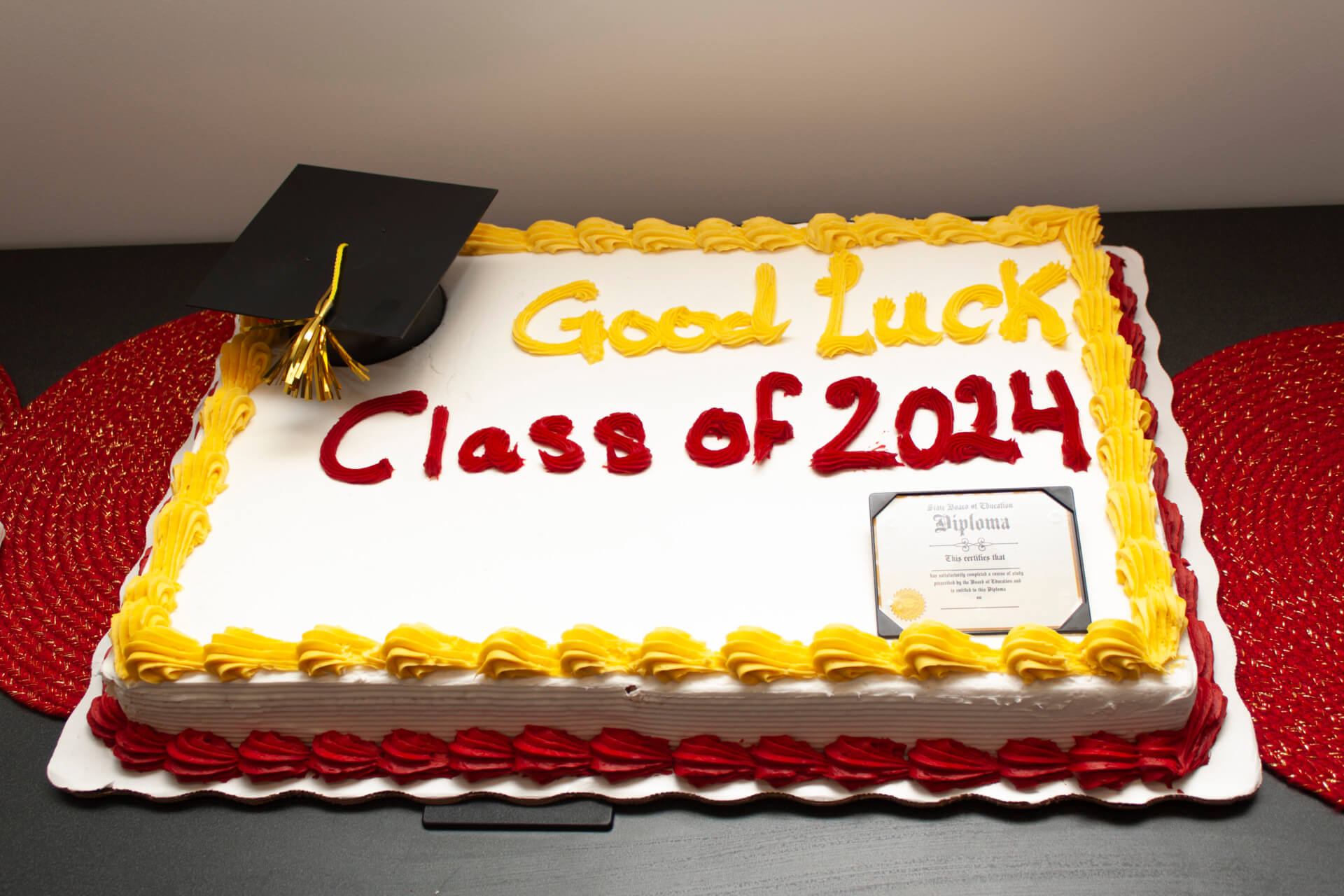
Congratulations to all of ISI’s Spring 2024 Graduates!
Ph.D. Graduates Yilei Zeng Kexuan Sun Meryem M’hamdi Julie Jiang Basel Shbita Binh Vu Avijit Thawani Pei Zhou
M.S. Graduates Namrata Sharma Twinkle Dhanak
Published on May 13th, 2024
Last updated on May 13th, 2024
Share This Story
Related Stories
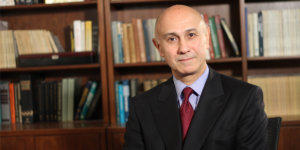
ABOUT THE SCHOOL
- 115 Year Celebration
- About Andrew Viterbi
- Diversity Equity & Inclusion
- Facts and Numbers
- Faculty Directory
- Ginsburg Hall
- USC Michelson Center
FROM THE DEAN
- Dean's Message
- Dean's Report
- Initiatives and Priorities
- Engineering +
- Strategic Plan
NEWS | MEDIA | EVENTS
- Keynote Lecture Series
- Media Contact & Press Releases
- Media Coverage
- Public Image Archive
- Publications
- Social Media
- Viterbi News Now
SCHOOL OF ADVANCED COMPUTING
- Thomas Lord Department of Computer Science
- Ming Hsieh Department of Electrical and Computer Engineering
- Division of Computing Education (DCE)
- Information Technology Program (ITP)
- Interdisciplinary Data Science (IDS)
- Information Science Institute (ISI)
- Institute for Creative Technologies (ICT)
- More to come soon
DEPARTMENTS AND ACADEMIC PROGRAMS
- Aerospace and Mechanical Engineering
- Astronautical Engineering
- Alfred E. Mann Department of Biomedical Engineering
- Mork Family Department of Chemical Engineering and Materials Science
- Sonny Astani Department of Civil and Environmental Engineering
- Daniel J. Epstein Department of Industrial and Systems Engineering
- Engineering in Society Program
- Information Technology Program
EXECUTIVE AND CONTINUING EDUCATION
- Aviation Safety and Security Program
- Corporate and Professional Programs
ONLINE ACCESS
- Graduate Programs - DEN@Viterbi
SPECIALIZED GRADUATE PROGRAMS
- Financial Engineering Program
- Green Technologies Program
- Data Science Program
- Progressive Degree Program
- Systems Architecting and Engineering Program
RESOURCES AND INITIATIVES
- Academic Integrity
- Accreditation
- Awards Office
- John Brooks Slaughter Center for Engineering Diversity
- Division of Engineering Education
- Globalization
- K-12 Outreach
- USC Experts Directory
- Women in Science and Engineering
FIRST YEAR APPLICANTS

MASTER'S APPLICANTS

PHD APPLICANTS

TRANSFER APPLICANTS

RESEARCH ENVIRONMENT
- Search Faculty Research Areas
- Departments, Research Institutes and Centers
- Research Infrastructure
- Research Initiatives
- Research Vision
- Student Research
- Summer Undergraduate Research Experience
TECHNOLOGY INNOVATION AND ENTREPRENEURSHIP
- NSF I-Corps Hub: West Region
- Office of Technology Innovation and Entrepreneurship
- USC Stevens Center for Innovation
- Viterbi News Network
- Diversity Equity Inclusion
- Dean’s Message
- Dean’s Report
- Media Contact & Press Releases
- More to Come Soon
- Biomedical Engineering
- Informatics Program
- Graduate Programs – DEN@Viterbi
- First Year Applicants
- Master’s Applicants
- PHD Applicants
- Transfer Applicants
- Competitions
- Entrepreneurship
- I-Corps Node
- Viterbi Startup Garage
- Viterbi Student Innovation Institute (VSI2)
- Viterbi Venture Fund

IMAGES
COMMENTS
Sometimes individually, sometimes in groups, USC undergraduates conduct research with guidance from distinguished faculty leaders. Imagine presenting your findings at a conference or publishing your research. With so many opportunities and funding sources, you can do it here. Discovery Scholars Our signature program that honors students who engage in undergraduate research or artistic endeavor ...
Undergraduate Research. One of the most exciting options available to undergraduates in USC's Psychology program is the potential to take part in cutting-edge research projects. Because USC is a leading research institution, students have many routes for involvement in innovative studies. Your coursework will provide an important component of ...
Viterbi undergraduate students are encouraged to get involved in research throughout their time at USC. Benefits of undergraduate research involvement includes: Practical application of classroom knowledge. Enhanced problem-solving and analytical abilities. Exploration of academic interests. Networking opportunities through conferences.
Undergraduate students in the Department of Physics and Astronomy at USC are strongly encouraged to participate in some form of research during their residency. If you have a research interest, find out what research is currently being done in the department. Then talk to your advisor, any of the faculty doing the research that has your ...
As one of our core missions, research defines USC Dornsife. Here, a dynamic community of over 500 research-active scholars across the humanities, social sciences, and natural sciences uncovers new knowledge and offers new ways to make sense of the world. ... USC Dornsife undergraduate students recently engineered microbes to quickly remove ...
In partnership with faculty, CURVE facilitates the placement of Viterbi undergraduate students in research labs to gain hands-on experience on faculty-led projects. CURVE fellows receive stipends and participate in professional development opportunities that prepare them as future leaders in engineering and computer science research.
The USC Leonard Davis School offers numerous opportunities for undergraduates to participate in research. Conducting research at USC Leonard Davis is a great way to get to know faculty, graduate students, and other undergraduates who share similar academic and career interests. Students participating in research at our school have published ...
The standard stipend for an academic semester is $1,500, assuming an average of eight to ten hours of student research per week. The standard summer stipend is $3,000, assuming an average of at least twenty hours of student research per week for at least eight weeks. Awards per proposal are limited to a maximum of $6,000 (limited to $3000 per ...
USC undergraduate research has prompt payoff. Jada Hislop is a first-generation college student who already has research experience as an undergraduate. (USC Photo/Gary Polakovic) Jada Hislop came to USC from Georgia, the first person in her family to attend college. She began in a work-study program in molecular and computational biology at ...
Viterbi Research Programs. For Current Viterbi Students If you are currently a Viterbi undergraduate, click here to find opportunities available to you. For Non-USC Students If you are an undergraduate student at another university, click here to find opportunities available to you. Published on November 5th, 2021. Last updated on August 28th ...
Summer Undergraduate Research Fund (SURF) Summer Humanities Undergraduate Research Experience (SHURE) SURF and SHURE are opportunities for USC Dornsife students to pursue research in conjunction with Dornsife faculty members, either on or off campus, during the summer semester. The purpose of SURF/SHURE is to connect students with faculty members and their research.
Undergraduate Study. Setting yourself up for success begins with considering all your options. At USC, a community is waiting to help you build your path to your future. Work across disciplines with leading experts and supportive faculty that will make you rethink what learning means. Cross the globe with our dynamic, global community or spend ...
Undergraduate researchers like Courtney Cooper gain valuable experience beyond the classroom. Embark on your journey of exploration today. Research is all about asking questions and finding answers. The Office of Undergraduate Research — a division of the USC Office of the Vice President for Research — connects undergraduate students in ...
Mika Ishii earns her Bachelor of Science in Global Health and minor in Natural Sciences from USC. Bokie Muigai May 13, 2024. (Photo courtesy Mika Ishii) "Every "first" that year felt really special!"'~Mika Ishii. In 2020, Mika Ishii started her freshman year online, signing-in from her hometown in Hawaii. "All my classes were on ...
The inaugural event of the USC and Techstars Digital Economy Program took place the first weekend in April, serving as the kick-off for the newly announced partnership. The USC and Techstars Digital Economy Program is focused on startups working on digital advancement across bioscience, biomedicine, physical science, engineering, information, and computer sciences. The first event, Startup ...
The 5th Annual Los Angeles Immigration Summit is a two-day, in-person convening that bolsters the power of L.A.'s immigrant communities. The 2024 Summit theme is: "Leading a Bold, Just, and Inclusive Democracy.". When: July 11 & 12, 2024 Location: Los Angeles Trade-Technical College (LATTC) 400 W Washington Blvd Los Angeles, CA 90015.
"It's been an amazing journey," said Basel Shbita, a newly minted Ph.D. who worked as a Graduate Research Assistant at USC's Information Sciences Institute (ISI). On Thursday, May 9th, ISIers in the Marina del Rey office gathered to celebrate the Spring 2024 GRA graduates, including eight who graduated with doctoral degrees, and two masters students.